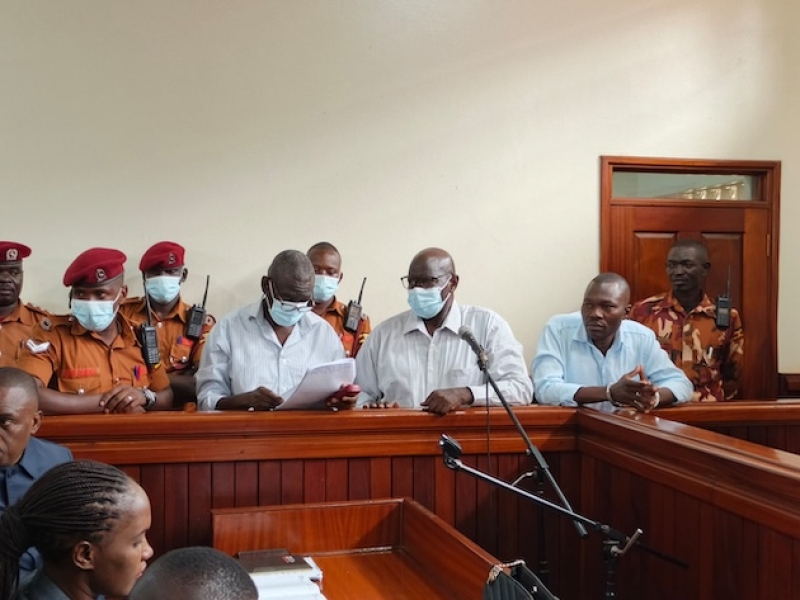- Israel Strikes Tehran with US Support Amid Nuclear Tensions |
- India Sees 9% Drop in Foreign Tourists as Bangladesh Visits Plunge |
- Dhaka Urges Restraint in Pakistan-Afghan War |
- Guterres Urges Action on Safe Migration Pact |
- OpenAI Raises $110B in Amazon-Led Funding |
Opposition Faces Crackdown in Tanzania and Uganda

In East Africa’s Tanzania and Uganda, political tensions are rising ahead of upcoming elections. Tanzania is scheduled to go to the polls in October 2025, while Uganda’s presidential and general elections will take place in early 2026.
In both countries, leading opposition figures—Tundu Lissu of the Chadema party in Tanzania and Dr. Kizza Besigye, former leader of Uganda’s largest opposition party—are in detention on treason charges.
Political and civil society actors across Tanzania, Uganda, and neighboring Kenya warn of a sweeping wave of repression that threatens democracy and civil liberties throughout East Africa.
Civil society groups have reported numerous cases of torture, abductions, and other human rights abuses that have severely restricted civic space.
On April 10, 2025, Lissu was charged with treason and three counts of spreading false information under cybercrime laws. The charges are linked to his nationwide campaign for electoral reform under the slogan “No Reforms, No Election.” During a court appearance on June 16, he was granted permission to represent himself after claiming he was denied private consultations with his lawyers.
Following his arrest, Chadema was disqualified from the October 2025 presidential and parliamentary elections for refusing to sign the electoral code of conduct.
Lissu, who narrowly survived an assassination attempt in 2017 and was forced into exile, faces renewed persecution upon his return.
Ahead of Tanzania’s November 2024 local elections, the government cracked down on opposition activity, arresting hundreds, restricting social media, banning independent media, and obstructing opposition rallies.
Four government critics were forcibly disappeared, and one Chadema official was abducted and killed.
Forced Deportations and Allegations of Torture
On May 19, as Lissu returned to court, Tanzanian authorities deported Kenya’s former Justice Minister Martha Karua and former Chief Justice Willy Mutunga, along with several Kenyan journalists. They had traveled to Tanzania at the invitation of the East Africa Law Society.
Kenyan activist Boniface Mwangi and Ugandan activist Agather Atuhaire were arrested and held incommunicado for five days. Both reported being tortured by Tanzanian authorities.
Atuhaire, recipient of the U.S. State Department’s International Women of Courage Award and the 2023 EU Human Rights Defenders Award, described being blindfolded, stripped, handcuffed, and assaulted. She said the abuse included sexual violence and threats of rape.
Mwangi, who was found near Tanzania’s coastal border, said he could barely walk due to the abuse.
Warning from Tanzanian President
President Samia Suluhu warned foreign activists to stay out of Tanzania, claiming they were “undisciplined individuals” who had ruined their own countries.
Amnesty International’s East and Southern Africa Director Tigere Chagutah condemned the torture of the two activists, calling it “unimaginable cruelty” and warning that Suluhu’s remarks enabled further abuses.
Karua denied any meddling, stating she was in Tanzania to observe a public trial. “We, as citizens of East Africa, have a duty to stand in solidarity against autocratic tendencies,” she said.
Uganda’s Escalating Crackdown
In Uganda, opposition figure Kizza Besigye was abducted in Nairobi in November 2024 and extradited to Uganda without due process, according to his lawyers. He was charged with treason in a civilian court after a Supreme Court ruling barred military trials for civilians.
Uganda's Parliament responded by passing legislation expanding the military’s power to try civilians. President Museveni has since signed the bill into law.
UN Human Rights Chief Volker Türk expressed concern, warning the law violates international obligations.
European diplomats have condemned Uganda’s treatment of opposition leaders. General Muhoozi Kainerugaba, Museveni’s son and head of the armed forces, recently admitted to detaining Bobi Wine’s bodyguard Eddie Mutwe and bragged about his torture on social media.
Justice Minister Norbert Mao criticized the abuse, calling it a misuse of judicial processes.
Kainerugaba has also threatened Wine and his National Unity Platform supporters, labeling them a security threat.

